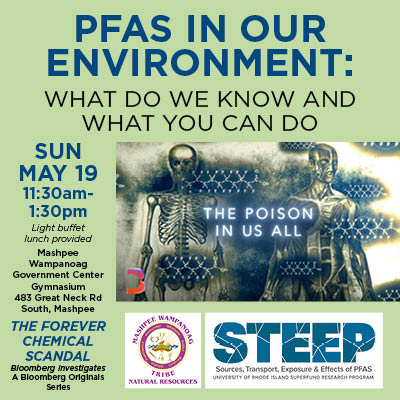Mashpee Wampanoag Tribe Film Screening and Panel on PFAS
 The Mashpee Wampanoag Tribe and STEEP are hosting a film screening and panel discussion about PFAS in the environment on Cape Cod. The event will feature a 50-minute documentary film called “The Poison In Us All” produced by Bloomberg Investigates. The film chronicles how this persistent and dangerous class of chemicals found their way into every corner of the planet and every aspect of our daily lives. The screening will be followed by a panel discussion with members of the Tribe and the STEEP science team, including a presentation of the team’s results from PFAS testing in locally caught fish and shellfish on the Upper Cape. The program will conclude with a Q&A session with the audience.
The Mashpee Wampanoag Tribe and STEEP are hosting a film screening and panel discussion about PFAS in the environment on Cape Cod. The event will feature a 50-minute documentary film called “The Poison In Us All” produced by Bloomberg Investigates. The film chronicles how this persistent and dangerous class of chemicals found their way into every corner of the planet and every aspect of our daily lives. The screening will be followed by a panel discussion with members of the Tribe and the STEEP science team, including a presentation of the team’s results from PFAS testing in locally caught fish and shellfish on the Upper Cape. The program will conclude with a Q&A session with the audience.
The event is FREE and open to the public. All are welcome!
WHAT: “PFAS in our environment: What do we know and what can you do?”
WHEN: May 19, 2024, 11:30 a.m. to 1:30 p.m.
WHERE: Tribal Government Center gymnasium, 483 Great Neck Rd South, Mashpee, MA
Program:
- 11:30 a.m.: Welcome, light lunch available
- 11:45 a.m.: Film screening – “The Poison In Us All” by Bloomberg Investigates (48 min)
- 12:35 p.m.: Results of PFAS testing of fish and shellfish near Mashpee
- 12:50 p.m.: Panel Discussion and Q&A (Moderator: Dr. Emily Diamond, Assistant Professor, University of Rhode Island)
- 1:30 p.m.: Wrap up
Panelists:
- Dr. Rainer Lohmann, Professor, University of Rhode Island
- Dr. Laurel Schaider, Senior Scientist, Silent Spring Institute
- Heidi Pickard, PhD Candidate, Harvard University
- Jason Steiding, Director of Natural Resources, Mashpee Wampanoag Tribe
About STEEP: The Sources, Transport, Exposure and Effects of PFAS (STEEP) Superfund Research Program is a multi-institutional project funded by the National Institute of Environmental Health Sciences. Through STEEP, researchers at the University of Rhode Island, Harvard University, and Silent Spring Institute are studying PFAS on Cape Cod — how these chemicals move through our environment, how we are exposed through drinking water and diet, and how they affect our health. Local project partners include the Massachusetts Breast Cancer Coalition and the Sierra Club Cape Cod Group. The STEEP community engagement team has also been working with the Mashpee Wampanoag Tribe on various initiatives to understand how PFAS affect the Tribal community and to educate community members on reducing their exposures.
For more information about STEEP, visit: https://web.uri.edu/steep/